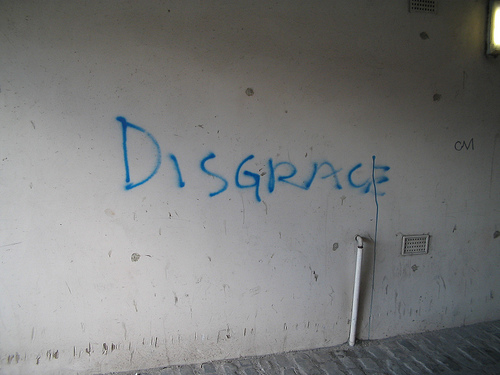Listen to the 6-minute podcast version
Watch a 1-minute introductory video
Society attaches a stigma to many groups, especially those struggling with addiction. Many of us are affected by this branding one way or the other: we are a victim of it, or we perpetuate it.
The type of stigma I’m talking about is that mark of disgrace we so easily attribute to a collection of people we deem unworthy. At best, such a label that defines individuals based on broad―often inaccurate―attributes is callous and self-righteous. At worst, it is cruel and harmful.
And with addiction, the stigma is killing people.
Derived from the ancient Greeks, stigma was the primitive practice of burning or cutting a part of the body of an objectionable person as a means to identify them to others. The bearer of this “mark” was to be avoided, shunned, and spurned in public. (Psychology Today)
What Are the Impacts of this Stigma?
There are tens of millions of people struggling with addiction in our country, and 90% of them will never seek help. The stigma of addiction is a big part of that problem.
The World Health Organization says addiction may be the most stigmatized condition in the world. Therefore, those who should be getting help are instead inhibited by fear: “My employer could fire me.” “My family will be ashamed of me.” “My church will think I’m a terrible person.”
This stigma presents a major barrier to people with an addiction disorder. It makes it harder for them to acknowledge their problem, seek help, or maintain their recovery. Therefore, many of them suffer in isolation for years, and some die from the disease.
Stigma is a perceived negative attribute that causes someone to devalue or think less of the whole person. (Dr. Kristalyn Salters-Pedneault)
If You Are a Victim of the Stigma of Addiction
If this stigma affects you, what can you do about it?
You can develop more self-awareness of your issues, and you can study how addiction works to learn what you can do to get better. Then, take positive steps to move forward, one day at a time. And know, deep in your heart, that these things are true:
- You are not broken – We all have issues, even if many people hide theirs well.
- You can recover – There is hope, and there are steps you can take to get better.
- You are not alone – There are people who can help, and many of them are just like you.
I’ve met hundreds of people who have struggled with addiction, just like me. You don’t have to live in shame, and you can get better. But it’s up to you to take the first step.
The earlier we catch it and intervene…the shorter the time to remission. Just like cancer, the earlier you catch it, the better the prognosis. (John F. Kelly, Ph.D.)
If You Perpetuate the Stigma of Addiction
If you support the position―the stigma―that addiction is merely a moral weakness or lack of willpower, what can you do about it?
You can begin to see those who are struggling as people. Listen to them while withholding judgment, and treat them with dignity and respect. Offer compassionate and empathetic support. And learn the facts about addiction:
- Addiction is a disease – The medical community and National Institute on Drug Abuse recognize addiction as a disease. Neuroscience proves addiction affects the chemistry of the brain, and people don’t have a choice on how their body reacts to drugs or alcohol.
- Addiction is hereditary – About 50% of the risk of addiction is genetically influenced.
- Addiction is treatable and preventable – The overall prognosis for drug and alcohol use disorders is good if the right programs are followed by those affected.
Addiction is treatable, and most people recover. (John F. Kelly, Ph.D.)
The stigma of addiction is cruel, and it can be deadly. What are you going to do about it?
Question: Are you a victim or a perpetrator of the stigma of addiction?
Action: Think of a step you can take to help lessen the effects of this stigma.
Share this article on:


